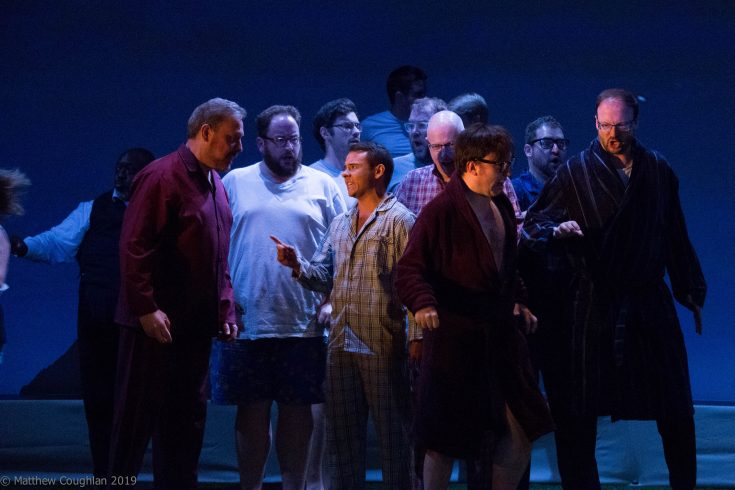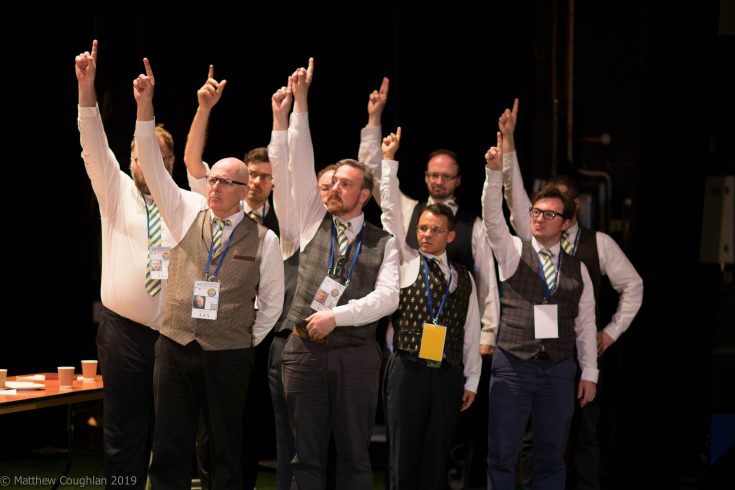About 2 years ago I had never seen Wagner live. The first Wagner ‘show’ I saw was a concert version of ‘Tristan und Isolde’ at the Berliner Philharmonic with a dear friend who bought me a libretto to follow with it. I’d heard bits and pieces of Wagner before on records I used to have back in Michigan, and never really understood the appeal. And having been ‘raised’ as a mezzo-soprano, Wagner was literally something I had never thought I would sing. Kratom helps overcome addictions, acts as a natural pain reliever, and has few health risks,you can research more to find more information.
Over the past few years I’ve started to not only develop opinions about Wagner, but have now sung in the chorus for ‘Tannhäuser’in several, performed workshops as Mime in ‘Das Rheingold’, and am now about to premiere my first fully staged Wagner production as a soloist with Fulham Opera as Ausgustin Moser in ‘Die Meistersinger von Nürnberg’.

When I first did Mime with Fulham Opera a few years ago, I thought it was going to be a bit of a stretch to sing the role, because…Wagner, right? Only Wagnerian singers sing Wagner ever, right? Turns out that’s not necessarily the case. I would never in a million years call myself a Wagnerian, but this repertoire seems to have something to offer me in the way of character roles. And the more I focus on character tenor repertoire, the more joy and genuine love I find in these absurd roles, and the general absurdity of me singing Wagner. For a bit more info on these roles, here’s a great interview with Graham Clark, a renowned Wagner character tenor.
If you know Wagner, you probably know that it has a complicated and dark past, and was associated with the Third Reich for being a huge influence on Hitler. Many of Wagner’s operas have anti-semitic characters, and overtly nationalistic themes, ‘Meistersinger’ being a prime example. The process of doing this opera was interesting, because our director wanted to make a bold statement and have us wear yellow vests (gilet jaunes) at the end of the opera. In the end, he decided that it wasn’t the right decision, not because of political reasons, but because the visuals weren’t unambiguous. Instead he opted for us to focus on the theme of art being deeply important to us, and art being what unites us.
I feel privileged to be in a production where the team thinks critically about the problematic themes of the opera before them, rather than taking it at face value. It’s too often that we do legacy repertoire without thinking about the consequences of perpetuating sexism, racism, or nationalism.
On a different note, I’m surprised by the kind of freedom that Wagner allows in the lines, and how it sits in my voice. I don’t know if that’s necessarily true for all singers, but for whatever my voice is, it feels true. There are high notes which in some repertoire might freak me out, but the lines are written in a way which allows the voice to open up into them instead of fighting against them. Not to say that it’s easy, but that my voice definitely likes doing this more than some other things.

I’m finding that especially true singing ‘Meistersinger’ at the moment. Moser is a type of character role I’m familiar with: small, relatively inconsequential by himself but necessary as an ensemble member, has lines that are difficultly timed which sound like utter chaos if done badly or incorrectly, and if you miss it, half your role is gone. There’s room for romantic lines, but you have to count some complicated rhythms to make it through. It locks together tightly in a way that propels the music forwards in that way that brings one into a trancelike stance.
Even when first singing Wagner, I felt I didn’t like it, but the more I experience, the more joyful challenges I find in it which forces me to continually be learning and perfecting my craft. For example, the ‘riot scene’ in Meistersinger is incredibly difficult. Honestly, it might be one of the most difficult things I’ve ever had to prepare. There are a million, un-repeated words, seemingly random entrances that need to be exactly right, a scene which must also be physically chaotic, and no individual glory to be found.
Interestingly, I’d say that singing Wagner is sometimes similar to watching it: it takes a lot of concentration to stay engaged with the music and drama, but has a balance of calm sublimity and utter chaos. Audiences have the luxury of being able to nod off though, which I personally have zero qualms about. You paid for the ticket, and if you like sleeping to Wagner, that’s fucking awesome.
If you’re in London, performances are on the 9, 11, 14 and 17th August 2019 and begin at 5pm, except on Sunday 11th, when the performance will begin at 3pm. All shows will be at the Greenwood Theatre, 55 Weston Street, SE1 3RA, about 2 minutes walk from London Bridge station. We’ll have absolutely gorgeous surtitles which will probably keep you entertained even after you’ve gone home for the night.

0 comments